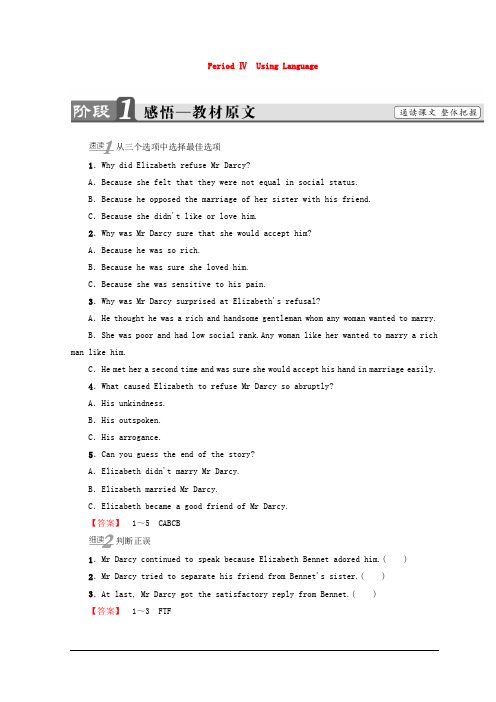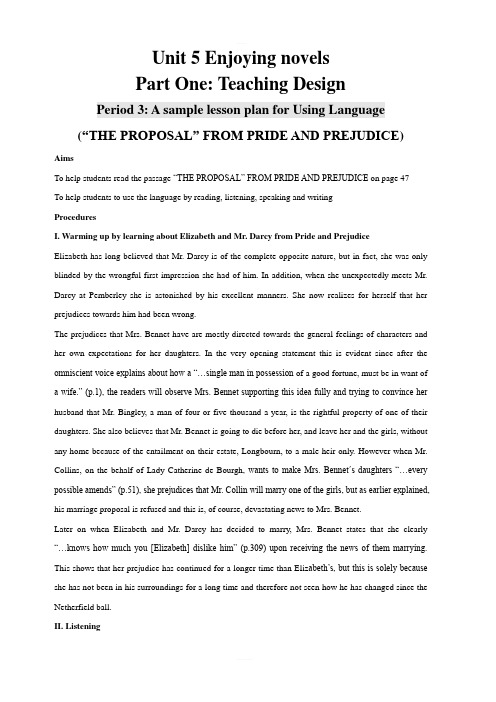2018-2019学年高中英语选修10Unit 5 Using Language
- 格式:ppt
- 大小:20.92 MB
- 文档页数:169

Period ⅣUsing Language从三个选项中选择最佳选项1.Why did Elizabeth refuse Mr Darcy?A.Because she felt that they were not equal in social status.B.Because he opposed the marriage of her sister with his friend.C.Because she didn't like or love him.2.Why was Mr Darcy sure that she would accept him?A.Because he was so rich.B.Because he was sure she loved him.C.Because she was sensitive to his pain.3.Why was Mr Darcy surprised at Elizabeth's refusal?A.He thought he was a rich and handsome gentleman whom any woman wanted to marry.B.She was poor and had low social rank.Any woman like her wanted to marry a rich man like him.C.He met her a second time and was sure she would accept his hand in marriage easily.4.What caused Elizabeth to refuse Mr Darcy so abruptly?A.His unkindness.B.His outspoken.C.His arrogance.5.Can you guess the end of the story?A.Elizabeth didn't marry Mr Darcy.B.Elizabeth married Mr Darcy.C.Elizabeth became a good friend of Mr Darcy.【答案】1~5 CABCB判断正误1.Mr Darcy continued to speak because Elizabeth Bennet adored him.( )2.Mr Darcy tried to separate his friend from Bennet's sister.( )3.At last, Mr Darcy got the satisfactory reply from Bennet.( )【答案】1~3 FTF1.in vain 徒然;徒劳(教材P47)In vain have I struggled!我怎么挣扎都不行!I tried to make his peace with her, but in vain.我试图使他与她和好,但还是白搭。

Unit 5 Enjoying novelsPart One: Teaching DesignPeriod 3: A sample lesson plan for Using Language (“THE PROPOSAL” FROM PRIDE AND PREJUDICE)AimsTo help students read the passage “THE PROPOSAL” FROM PRIDE AND PREJUDICE on page 47To help students to use the language by reading, listening, speaking and writingProceduresI. Warming up by learning about Elizabeth and Mr. Darcy from Pride and PrejudiceElizabeth has long believed that Mr. Darcy is of the complete opposite nature, but in fact, she was only blinded by the wrongful first impression she had of him. In addition, when she unexpectedly meets Mr. Darcy at Pemberley she is astonished by his excellent manners. She now realizes for herself that her prejudices towards him had been wrong.The prejudices that Mrs. Bennet have are mostly directed towards the general feelings of characters and her own expectations for her daughters. In the very opening statement this is evident since after the omniscient voice explains about how a “…single man in possession of a good fortune, must be in want of a wife.” (p.1), the readers will observe Mrs. Bennet supporting this idea fully and trying to convince her husband that Mr. Bingley, a man of four or five thousand a year, is the rightful property of one of their daughters. She also believes that Mr. Bennet is going to die before her, and leave her and the girls, without any home because of the entailment on their estate, Longbourn, to a male heir only. However when Mr. Collins, on the behalf of Lady Catherine de Bourgh, wants to make Mrs. Bennet´s daughters “…every possible amends” (p.51), she prejudices that Mr. Collin will marry one of the girls, but as earlier explained, his marriage proposal is refused and this is, of course, devastating news to Mrs. Bennet.Later on when Elizabeth and Mr. Darcy has decided to marry, Mrs. Bennet states that she clearly “…knows how much you [Elizabeth] dislike him” (p.309) upon receiving the news of them marrying. This shows that her prejudice has continued for a longer time than Eliz abeth’s, but this is solely because she has not been in his surroundings for a long time and therefore not seen how he has changed since the Netherfield ball.II. ListeningGo to page 46 and do exercises 1, 2, and 3.III. Discussing what kind of person will make a good friendA Good FriendIn kindergarten your idea of a good friend was the person who let you have the red crayon when all that was left was the ugly black one.In primary school your idea of a good friend was the person who went to the bathroom with you; held your hand as you walked through the scary halls; helped you stand up to the class bully; shared their lunch with you when you forgot yours on the bus; saved a seat on the back of the bus for you; knew who you had a crush on and never understood why.In secondary school your idea of a good friend was the person who let you copy their social studies homework; went to that "cool" party with you so you wouldn't wind up being the only freshie there; did not let you lunch alone.In pre-university your idea of a good friend was the person who gave you rides in their new car; convinced your parents that you shouldn't be grounded; consoled you when you broke up with Nick or Susan; found you a date to the prom or went to the prom with you (both without dates); helped you pick a university and assured you that you would get into that university; helped you deal with your parents who were having a hard time letting you go.On the threshold of adulthood your idea of a good friend was the person who was there when you just couldn't deal with your parents; assured you that now that you and Nick or you and Susan were back together, you could make it through anything; just silently hugged you as you looked through blurry eyes at 18 years of memories; and reassured you that you would make it in university as well as you had these past 18 years; and most importantly sent you off to university knowing you were loved.Now, your idea of a good friend is still the person who gives you the better of the two choices, hold your hand when you're scared, helps you fight off those who try to take advantage of you, thinks of you at times when you are not there, reminds you of what you have forgotten, helps you put the past behind you but understands when you need to hold on to it a little longer, stays with you so that you have confidence, goes out of their way to make time for you, helps you clear up your mistakes, helps you deal with pressure from others, smiles for you when they are sad, helps you become a better person, and most importantly loves you!Pass this url on to those friends of the past, and those of the future...and those you have met along the way. Thank you for being a friend.No matter where we go or who we become, never forget who helped us get there.There's never a wrong time to pick up a phone or send a message telling your friends how much you miss them or how much you love them.IV. Reading for forms and for contentsRead the article “THE PROPOSAL” FROM PRIDE AND PREJUDICE (on page 47) to: cut/ the sentence into thought groups, blacken the predicative, darken the connectives and underline all the useful expressions.V. Closing down by copying expressions and making sentences。

